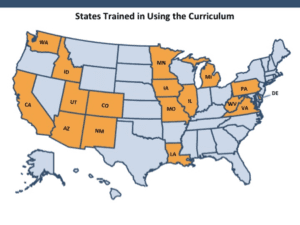State-Level Trainers Learn To Use the Mental Health Court Curriculum
 Charged with supporting and providing technical assistance to problem-solving courts in their states, a group of state-level trainers came together last month for a train-the-trainer event on how to use Developing a Mental Health Court: An Interdisciplinary Curriculum—a free, online curriculum that offers research and best practices on designing and implementing mental health courts. With support from the U.S. Department of Justice’s Bureau of Justice Assistance, the CSG Justice Center developed the online curriculum to assist jurisdictions interested in starting new mental health courts, as well as to help further the work of the 300 or so jurisdictions that have launched mental health courts since the early 2000s.
Charged with supporting and providing technical assistance to problem-solving courts in their states, a group of state-level trainers came together last month for a train-the-trainer event on how to use Developing a Mental Health Court: An Interdisciplinary Curriculum—a free, online curriculum that offers research and best practices on designing and implementing mental health courts. With support from the U.S. Department of Justice’s Bureau of Justice Assistance, the CSG Justice Center developed the online curriculum to assist jurisdictions interested in starting new mental health courts, as well as to help further the work of the 300 or so jurisdictions that have launched mental health courts since the early 2000s.
Participants from 10 states (Arizona, California, Louisiana, Michigan, Minnesota, Missouri, New Mexico, Pennsylvania, Washington and West Virginia) gathered in Denver, Colorado, on October 24 and 25 to learn how to use the curriculum in different ways to meet the training needs of jurisdictions across their states. During the day-and-a-half event, participants learned about the curriculum and the adult learning principles upon which it was developed, practiced facilitating activities, and discussed how to tailor the curriculum to local circumstances and contexts.
“I was excited about this training because interest in mental health courts is growing in California, and with it, the demand for training,” said Carrie Zoller, Supervising Attorney at the Center for Families, Children, and the Courts in the California Administrative Office of the Courts. “There are a lot of resources and trainings out there for drug courts, but there isn’t as much available for mental health courts. I am looking forward to using this resource to help local courts in California learn more about the existing research and to help them implement evidence-based practices as part of my work with the California Judicial Council’s Mental Health Issues Implementation Task Force.”
The training in Denver focused on the many ways in which the curriculum can be adapted to meet the needs of local teams—from assessing training needs to planning and facilitating interdisciplinary trainings using the curriculum. The training also included ideas on how to incorporate the curriculum into existing trainings and conferences.
Colorado’s State Problem-Solving Court Coordinator Brenidy Rice joined the group to share her experience using the curriculum in several jurisdictions in the state as a pilot site. “As a state-wide trainer, the customization possible with the curriculum is incredibly useful. I constantly work with jurisdictions that vary in their interest, readiness, and resources, so being able to have something that can be tailored to specific team needs and learning objectives is a great asset,” said Ms. Rice.
Participants at the Denver event join eight other state-level trainers who took part in the first train-the-trainer event held in February 2012 in Dallas and who have since used the curriculum in various ways throughout their states. All together, trainers from 17 states have been trained in using the curriculum in their local jurisdictions, in addition to the many other communities where the curriculum has already been in use.
To view a brief introductory trailer for the curriculum, click here.
_________________________________________________
 Developing a Mental Health Court is a free multimedia curriculum with the information teams need to plan, implement, sustain, or simply learn about mental health courts based on research and best practices from the field. It is a crucial one-stop resource for judges, behavioral health treatment providers, court managers, judicial educators, probation officers, and many others. Since its release in January 2013, almost 15,000 treatment providers, judges, court coordinators, and others have used this great resource.
Developing a Mental Health Court is a free multimedia curriculum with the information teams need to plan, implement, sustain, or simply learn about mental health courts based on research and best practices from the field. It is a crucial one-stop resource for judges, behavioral health treatment providers, court managers, judicial educators, probation officers, and many others. Since its release in January 2013, almost 15,000 treatment providers, judges, court coordinators, and others have used this great resource.
The sharp rise in school shootings over the past 25 years has led school officials across the U.S.…
Read MoreA three-digit crisis line, 988, launched two years ago to supplement—not necessarily replace—911. Calling 988 simplifies access to…
Read MoreIt would hardly be controversial to expect an ambulance to arrive if someone called 911 for a physical…
Read More Taking the HEAT Out of Campus Crises: A Proactive Approach to College Safety
Taking the HEAT Out of Campus Crises: A Proactive Approach to College Safety
The sharp rise in school shootings over the past 25 years has…
Read More From 911 to 988: Salt Lake City’s Innovative Dispatch Diversion Program Gives More Crisis Options
From 911 to 988: Salt Lake City’s Innovative Dispatch Diversion Program Gives More Crisis Options
A three-digit crisis line, 988, launched two years ago to supplement—not necessarily…
Read More Matching Care to Need: 5 Facts on How to Improve Behavioral Health Crisis Response
Matching Care to Need: 5 Facts on How to Improve Behavioral Health Crisis Response
It would hardly be controversial to expect an ambulance to arrive if…
Read More Finding Solutions to Complex Criminal Justice Issues: Q&A with New CSG Justice Center Advisory Board Member Justice Briana Zamora
Finding Solutions to Complex Criminal Justice Issues: Q&A with New CSG Justice Center Advisory Board Member Justice Briana Zamora
The CSG Justice Center Advisory Board establishes the policy and project priorities…
Read More









